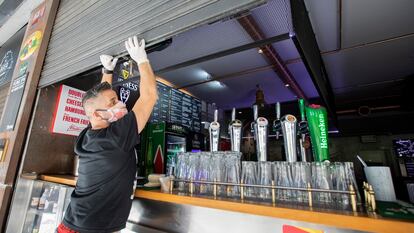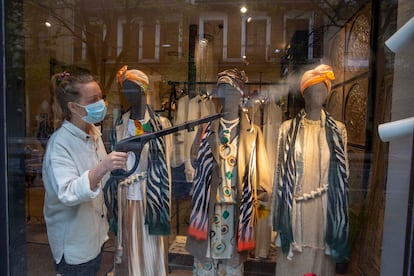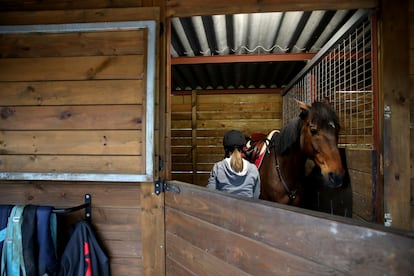Uncertainty looms as more businesses open in Spain under Phase 1
Store and restaurant owners are unsure whether revenue will offset operating costs despite the looser restrictions under the coronavirus deescalation plan

Spanish restaurants, cafés and stores were preparing to reopen or expand business on Monday as parts of the country moved into Phase 1 of the coronavirus deescalation plan. The move comes with a series of conditions to prevent a spike in transmission after Covid-19 deaths and infections declined from their peak in early April.
Spain introduced a strict lockdown on March 14, allowing people out only on essential business such as shopping for groceries or medicines. Children were first allowed out for supervised walks in late April, and this was followed by a partial relaxation of confinement measures for the general population.
Specific time slots for walks and exercise will for now remain in place, regardless of whether an area is in Phase 0 or Phase 1 of the deescalation plan, which is expected to be completed in late June if there are no spikes in coronavirus cases. But no time restrictions have been announced for going shopping or sitting at a sidewalk café or restaurant.
Despite the looser lockdown, many business owners are worried that their numbers may not add up, while many hotels remain closed and some museums are waiting to reopen later in the month.
Canary Islands
In Santa Cruz de Tenerife, restaurant terraces are expected to reopen gradually. On Monday, only a dozen or so business owners had plans to open their doors, out of fear that the trickle of customers would not cover their operating expenses.
Carmen Hermoso, 53, and her husband had plans to reopen today. “We have to get going, or we’ll never get ahead,” said Hermoso, who feels moderately optimistic about the future. Ever since she informed her customers that her establishment would reopen, she has received numerous calls for reservations. The 10 chairs in her outdoor terrace – 50% of capacity – are all booked, and the plexiglass shields are in place. Hermoso does not fear contagion from exposure to customers, but she is afraid that any potential new spike would “force us to step back.”
Over in Gran Canaria, the owner of a restaurant named Géiser admitted that he is nervous about reopening. “In 25 years I had never once closed, not even for Christmas,” said Fran Acosta, whose nine employees have been at home on a temporary layoff scheme known as an ERTE during the lockdown. On Monday, three of them will go back to work, and two more will join them on Wednesday. “After that, it will depend on demand,” said Acosta. On the sidewalk, 30 empty chairs are awaiting customers, while laminated menus sit on the tables.
Basque Country

On April 27, barely 15% of small businesses reopened in the Basque Country, but over 70% were expected to do so on Monday as the northern region entered Phase 1 of the deescalation plan. “There are fewer restrictions, yes, but many doubts,” said Sara Camuiñas, manager of Generación X, a fashion boutique in downtown Vitoria. “There’s no need to make appointments now, but we are considering making some days fully open, and keeping others open only by appointment; we’ll have to take it one day at a time.”
Retail business associations warned that the changing criteria with regard to opening conditions are creating a lot of uncertainty among customers. They also noted that business owners have yet to receive the state aid they applied for. “Two workers out of a staff of five are back, the others are still home on an ERTE,” explained Maider Muñoz, who is a third-generation owner of Almacenes Garibay, a clothing store in downtown San Sebastián. “We’re afraid that the cost of being open will be higher than our revenue. There is so much uncertainty.”
Andalusia
Seville’s cultural sector is preparing to go back to normal, although libraries and museums were not planning on opening this Monday. Seville’s Museum of Fine Arts – Spain’s most important painting gallery after El Prado in Madrid – is gearing up to reopen its doors, although no specific date has been offered yet. “My impression is that museums will open on May 25, although if we could be ready by the 18th... in theory, they will all open on the same day,” said Mar Sánchez, secretary general of the Cultural Innovation and Museums department at the regional government of Andalusia, which runs 16 cultural centers. Last year, the Museum of Fine Arts had 430,000 visitors.
Catalonia
The tourist-heavy towns along the coast of Tarragona were preparing to open bars, restaurants and terraces on Monday. Not so hotels, however, due to mobility restrictions on travel between provinces. “It would be suicidal and inconsistent to open up in these conditions,” said Xavier Roig, who is in charge of seven hotels in Salou, Calafell, Hospitalet de l’Infant and Comarruga. “Who is going to stay at a hotel that is just 100 kilometers from their own home?”
Roig said that his establishments, just like most others on the coast, are planning to stay closed until the area enters Phase 4 of the deescalation plan, probably in late June. “Why open before that if there will be no demand?”
Galicia

For some businesses, it is unclear whether moving into Phase 1 means that they can go back to normal activity. After two months without getting any exercise, the horses stabled at Centro Ecuestre Rebeca Román in Teo (A Coruña) “have lost weight and muscle mass.” Since the middle of last week, their owners were able to come and ride them via appointment. Now that Phase 1 is underway, Román says it is not certain what can and cannot be done because “the regulations are vague.” “We will wait for politicians to figure it out, so we can go back to our lessons,” she said. Although two people are now allowed inside the riding ring – the rider and the instructor – Román notes that it is impossible to maintain social distancing rules with children, because they need constant help. Another problem, she said, is that horses get scared when they see face masks.
With reporting by Noor Mahtani, Pedro Gorospe, Javier Martín-Arroyo, Marc Rovira and Silvia R. Pontevedra
English version by Susana Urra.
Tu suscripción se está usando en otro dispositivo
¿Quieres añadir otro usuario a tu suscripción?
Si continúas leyendo en este dispositivo, no se podrá leer en el otro.
FlechaTu suscripción se está usando en otro dispositivo y solo puedes acceder a EL PAÍS desde un dispositivo a la vez.
Si quieres compartir tu cuenta, cambia tu suscripción a la modalidad Premium, así podrás añadir otro usuario. Cada uno accederá con su propia cuenta de email, lo que os permitirá personalizar vuestra experiencia en EL PAÍS.
¿Tienes una suscripción de empresa? Accede aquí para contratar más cuentas.
En el caso de no saber quién está usando tu cuenta, te recomendamos cambiar tu contraseña aquí.
Si decides continuar compartiendo tu cuenta, este mensaje se mostrará en tu dispositivo y en el de la otra persona que está usando tu cuenta de forma indefinida, afectando a tu experiencia de lectura. Puedes consultar aquí los términos y condiciones de la suscripción digital.









































